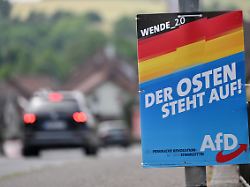Elections in East Germany
Political scientist considers “triumphal march of the AfD” possible
6/26/2023 6:32 am
“The taboo is now broken,” says Thuringia’s Prime Minister Ramelow about the success of the AfD in the district elections in Sonneberg. Scientists agree with him. It is becoming increasingly difficult for the other parties to engage in politics against the right-wing populists.
After the election victory of the AfD in the Thuringian district of Sonneberg, experts expect further successes for the right-wing populist party in East Germany. “If there isn’t a dramatic change in mood, next year’s state and local elections could be a triumph for the AfD,” said Dresden political scientist Hans Vorländer.
In the district of Sonneberg, the AfD candidate Robert Stuhlmann won the runoff election for the office of district administrator on Sunday. It is the first municipal top office for the right-wing party nationwide. The support of the Left, SPD, Greens and FDP for the CDU opposition candidate Jürgen Köpper was not enough to prevent the AfD from succeeding. Next year there will be state and local elections in Thuringia, Saxony and Brandenburg as well as local elections in Saxony-Anhalt and Mecklenburg-Western Pomerania. Vorländer said that the AfD would not govern at state level for lack of partners. However, large alliances between the other parties would be necessary in order to still get government majorities. “It is becoming increasingly difficult to do politics against the AfD or to win elections against the AfD,” said the director of the Center for Constitutional and Democracy Research at the TU Dresden.
District election campaign with federal political issues
As usual, the committees of the Bundestag parties meet on Monday, where the election in Sonneberg could be an issue. Green party leader Ricarda Lang had taken the result as a warning to all democratic forces. AfD candidate Stuhlmann had primarily campaigned against the policy of the traffic light coalition of SPD, Greens and FDP in the federal government – with energy and refugee policy as the focus. The Thuringian SPD state chairman Georg Maier also blamed the unstable political conditions in the federal state for the outcome of the district election. There is not enough progress on many issues that concern people because the red-red-green minority government is dependent on the approval of the CDU. “We’re really going in circles sometimes,” said Maier.
Political scientist Vorländer spoke of a mixture of different motives among the voters. The AfD has been deeply rooted in many regions of East Germany for years and in some cases has a potential of more than 30 percent. Many people have conservative, right-wing populist, right-wing national or even ethnic attitudes. At the moment there is dissatisfaction with the federal government. “This is fertile ground for the AfD,” said Vorländer.
Thuringia’s Prime Minister Bodo Ramelow expects that AfD candidates will be elected even more frequently at municipal level in the future: “The taboo has now been broken,” he said “t-online”. At the same time, he rejected the assumption that the voters in Sonneberg were predominantly right-wing extremists. “People have given politics a lesson,” the left-wing politician explained the election result. “For years, East German life experiences have been ignored and East Germans have not been included”. The East is only looked at if something negative happens there, the successes are overlooked. “This leads to a reaction of defiance among people,” said Ramelow.
